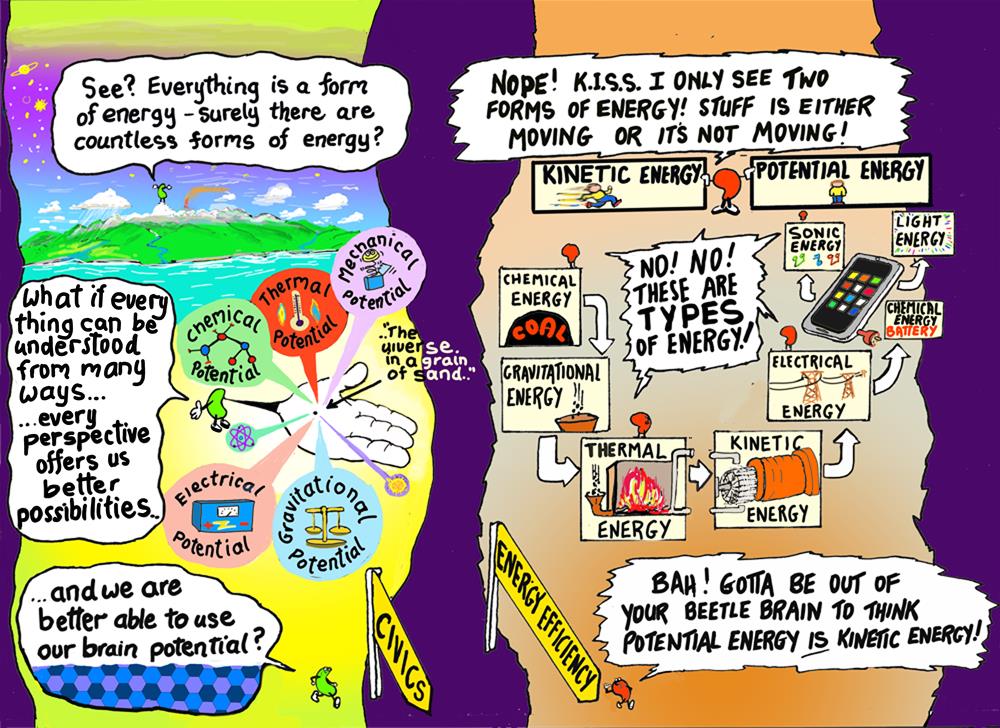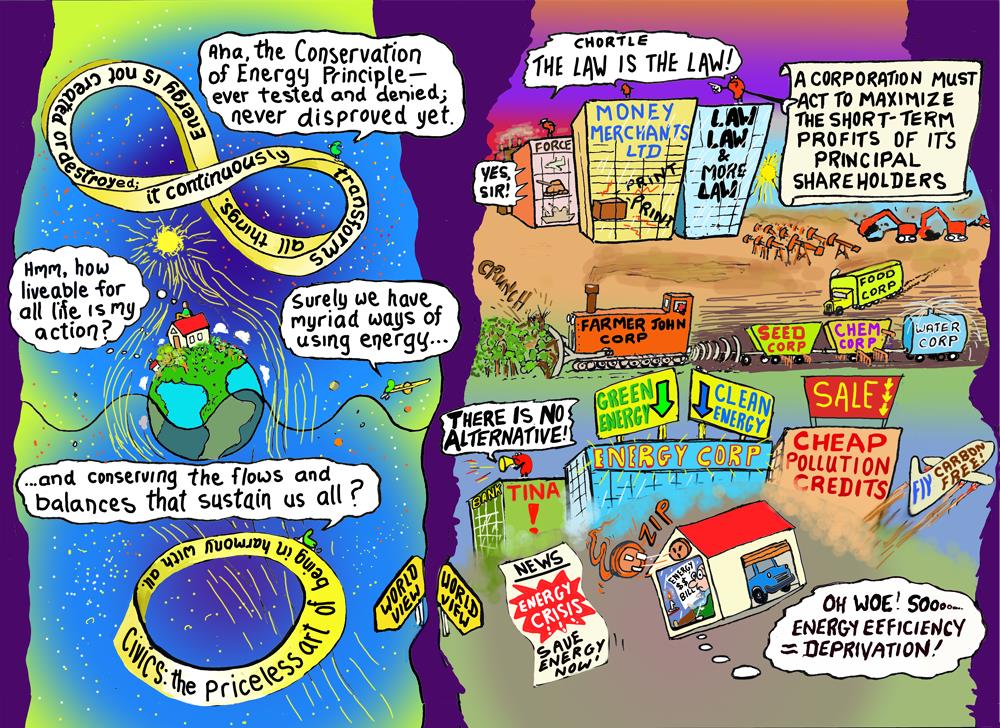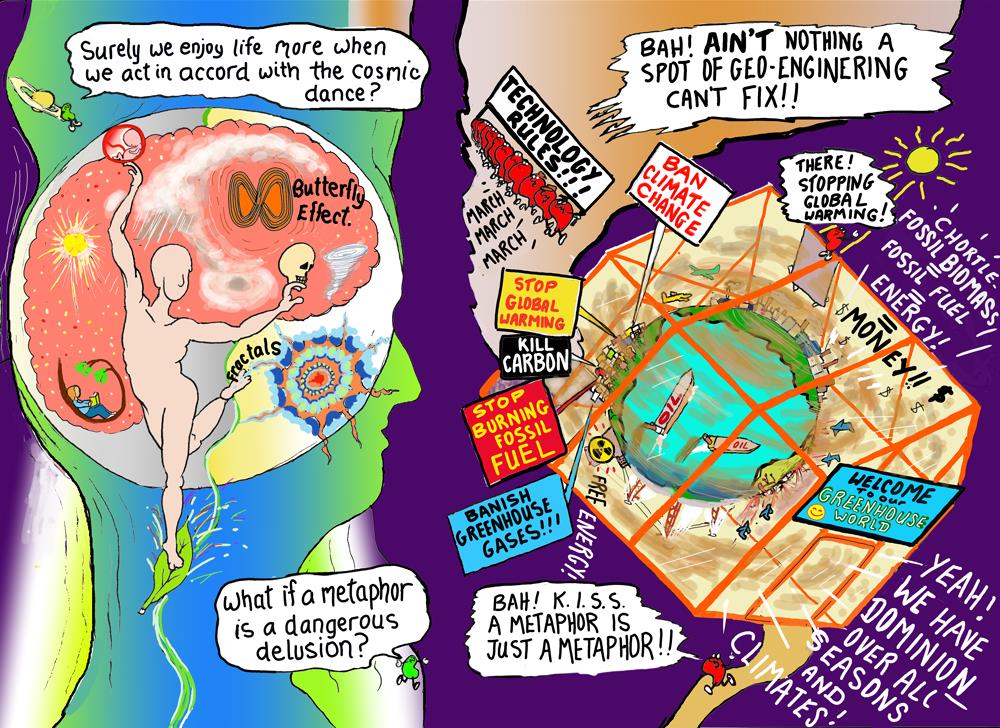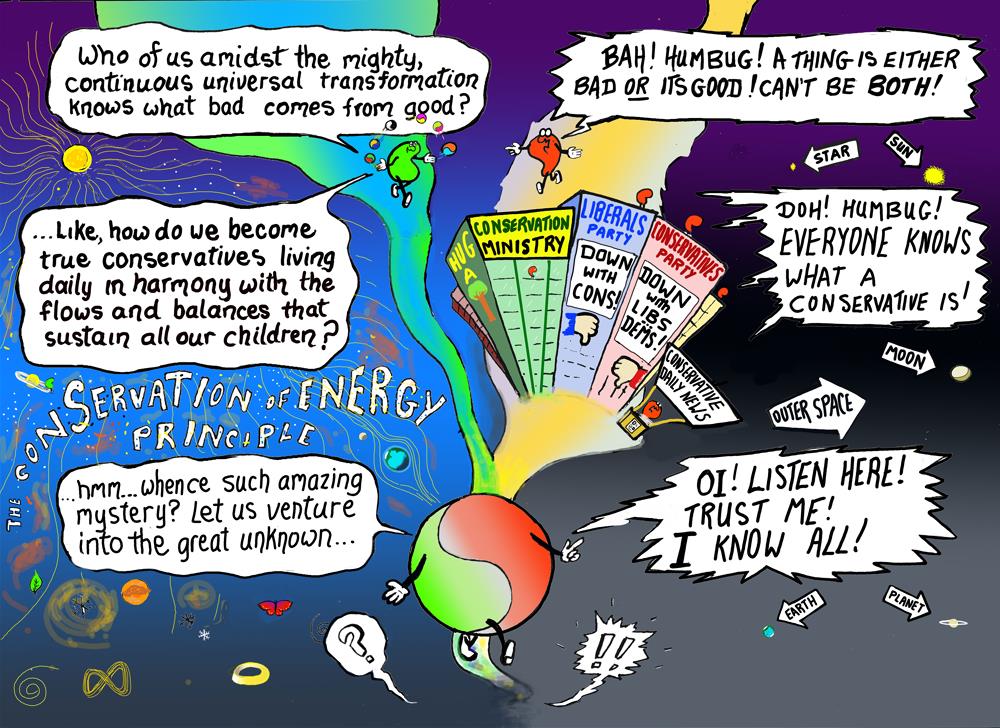(On untying the bonds of the mother tongue)
If names be not correct, language is not in accordance with the truth of things.
It is said that Confucius warned us thus 2.5 millennia ago.
Awakening to a Revelation
The question arises: how would you respond if one morning you woke up with the realization, “Woh, my mother tongue, the language that most expresses my being, is actually my own worst enemy and it now threatens the existence of mankind!”Would you respond with shock, horror, dismay, disbelief, fear, paralysis, anger, outrage, elation, relief, compassion or point-blank denial?
Would you shout, scream, choke, gag, wail, moan, laugh, giggle, fumble, mumble or be struck dumb?
What would you say? What could you say? Perhaps, like me, you might experience a tumult of all these responses in that moment of revelation?
My moment of revelation occurred as an “oh ugh moment” in which existence suddenly fractures asunder and I am tottering on the edge of an abyss of social alienation, roiling warfare and death. At the same time it was an “aha moment” of jaw-dropping delight as a whole, new wondrous vista suddenly spread open around me. It was also an “hahaha moment” as something in me saw humour in the human condition and the incredible, ingenious trickery of the self-deceiving ego.
Nothing could have prepared me for my experience of this moment of truth – not even the many thousands of hours I have given this century to searching for a science in our communication of the nature of energy in general and climate processes in particular.

Brief Biography – A Seminal Moment
It had become apparent to me at the end of the 20th century that our Anglosphere culture is distilled psychopathy, a vast engine generating delusional hopes and dystopia. In a moment of profound despair something deep in me cracked, enabling me to pray to the universe in most open way for guidance on what to do, whence to go and what to say and to whom.
Suffice to say, people and events conspired soon after this rare act of courage to send me on this unimaginable 3000 year-long journey to the Proto-Indo-European sources of my English language in search of meaning and true hope. Perhaps the most enabling individual was Douglas Harper, the amazing person who established the first Online Etymology Dictionary in 2000 and gave me the key to my mother tongue for free at a time when I was often too poor to buy a bus ticket to go to the library.
A Great Central Question
I gave many hours in the early years of this journey to attending the public lectures and sermons of all the acclaimed “energy gurus” and “climate communicators” flitting through Wellington City, the capital of New Zealand.

Few, if any, of these ” top world influencers” provided me with valuable new insights into the human condition. However they did stimulate and help me to distill my search into one great question: what enables a man (human being) to say one thing, do the opposite and yet remain oblivious to the contradiction.
And a most fascinating aspect of this behavioural phenomenon is that it seems the most highly educated people in our English culture such as academics, journalists, “scientists” and our policy makers tend to be the most exquisitely skilled at rationalizing this dissonant behaviour.
This great question became to be central to my journey with many other great questions spinning off it so my journey has resembled a spider’s cobweb or a network of neurons rather than a linear, inductive process. The question of man’s capacity to deny reality is a great one because it involves the nexus of physics, psychology and philosophy – the latter meaning “the loving of wisdom”. It also explains the Anthropocene (Anglopocene?) and involves the survival of mankind.
Here are some of the most grand of those questions:
What is energy?
What is the nature of information and are there universal rules informing all sentient forms?
What is the greatest truth we know and how is this reflected~generated in our general use of language?
Is the human psyche essentially consistent, coherent or chaotic?
What is the relationship between the ego and compassion?
How can we transcend paradox and the limitations of the ego, thoughts and words?
And perhaps most pertinent to this search for meaning – how are radical changes in our Anglosphere culture manifest in our use of English language?
This question is limited to English because I am only inculcated in The Crown dialect of English – here in New Zealand our English Education system actively discouraged us from learning non-European languages such as Maori or Chinese. However the question is doubly pertinent because this dialect of English is the dominant language of global business and so is profoundly implicated in the generation of the Anthropocene (Anglopocene?).

Brief Biography – How came the Unexpected
The purpose of providing this brief biography is to share with you how any very common, ordinary human being like me can dare to question the wisdom of the language used by our most revered media people, be they a highly qualified teacher, journalist, “scientist”, “physicist”, “climate guru” or even a world-renowned cognitive linguist.
Here are some of the many reasons why my extended foray, no, forage, no, search for sustenance in the field of cognitive linguistics was unimaginable.
It is fair to say there is a consensus in our NZ English School Establishment that I am an academic failure and a bit a crackpot into the bargain.
Apart from the occasional year out to fail as a student, my career for over 50 years has been as a labourer. In particular it has involved walking countless miles of streets as a meter reader and, this last 17 years, reversing the entropy of our society as a school cleaner.
My dreams of becoming a professional cartoonist were stillborn in our feudal White Supremacist culture with its terrible addiction to cars, jets, wars and planned obsolescence.
Often too tired to read a book after a day’s slog, the advent of my diplopia early this century now made reading books nigh on impossible.
And, of course, I could never have imagined that Douglas Harper would bequeath on us his Online Etymology Dictionary at a time when I was unemployable and living in a converted garage.
However the unimaginable breeds the unexpected and it turns out the adverse factors listed above all afforded me unique insights and tools to search for meaning in this time of a dangerous Anthropocene (Anglopocene?). Here are a few examples of my seeming liabilities and misfortunes turned out to be amazing assets:
Pictures can collate and express paradoxical ideas in ways words never can. Indeed a drawing teacher taught me more physics in a ten-minute sketching exercise than my “Physics” teachers had been able to communicate in a decade of lectures. None had the tools to communicate the nature and meaning of paradox, which is our prime experience of existence.
My diplopia made reading large blocks of text difficult and this incapacity inspired me to develop ways of identifying potent words, scanning text for their given meaning and evaluating how in accord their use is with the principles of physics.
My alienation and exile from a career in our main media liberated me from many of the severe restraints that bind our professional teachers, journalists and other merchants of opinion.
There is an additional factor that enabled and sustained me in my search for true hope in my mother tongue. It was my good fortune to be born and bred on the forest-clad banks of the Waiorongomai river, which arises in the Remutaka hills, traverses rolling farmlands and passes into Lake Wairarapa.
My being is infused with the river’s story of the universe, informed by timeless days of play amidst its waters. At night its distant murmur, chatter and chuckles with its boulders informed my dreams to the hills, the stars and beyond.
“The Creek”, as we called this beautiful stream, remains my greatest teacher. Its wisdom still infuses my being several decades on, ever reminding me in the principles of physics, making nonsense of the teachings of our English media and sustaining me secure in solitude.

As mentioned, this brief biography is to assure you any common man has the capacity to learn the ancestry of their mother tongue and use it so it sustains our children. Man does not need to be able to perform complex mathematical equations to understand the physics. Nor does man have to be a wordsmith and clever with inductive logic to appreciate the philosophy. The main requisite is the enjoyment of a healthy balance of compassion with its open spirit of inquiry.
A Simple Message
My message is simple: without compassion, the ego in all men can make any of us our own worst enemy. There is no magic cure for our human condition. However we can avoid much pain and heartache by simply giving care to our use of our mother tongue and endeavouring to ensure it is in accord with the principles of physics.
It might be helpful to define “simple” in case you are dismissing this message as “naive”, “foolish”, “stupid” or “moronic”. Perhaps give a moment to reading the Online Etymology Dictionary article on the word “simple” because it is a fascinating story.
Observe how its use in Modern English is more ego-driven and exclusive. “Simple” is now used demean, disparage and dismiss people, as with “simpletons”. The earlier meaning was more compassionate and inclusive. Observe how “simple” arises from the PIE compound “sm-plo” – “sem” means “one, as one, together with” + “fold”.
This message is simple in that it speaks to the scientist, the artist, the physicist, the psychologist, the philosopher and the compassionate element residing in every man.
Perhaps you find this statement absurd? People inculcated in our English culture will tend to struggle to comprehend or believe it. Like me, they are graduates of an English school system governed by state education frameworks in which the word “compassionate” is absent and 99% of students graduate as failures, disempowered and firm in the belief they are non-scientists, non-artists, non-physicists, non-psychologists and non-philosophers.
I was getting on 60 years-old of failure before it occurred to me to question the meaning of these seeming eternal Anglosphere disciplines – I simply trusted that my Science, Physics, Psychology, Art and other teachers knew what they are saying, especially our university lecturers.
Most of my peers still have not questioned the meaning of these words and yet, as I discovered, one has only to give a few minutes to check their etymology, the story of their changed meanings over millennia.
Observe how the meaning given to all these words vastly changed with “The English Industrial Revolution”, which is more truthfully called the English Combustion Revolution. Fundamentally this revolution involved a radical, fatally-flawed belief that all Earth’s biomass (living and fossilized) exists to be burned as a source of wealth to merchant bankers of The Crown the rulers of the global English Empire. Hence we Anglosphere people speak glibly of mineral oil/gas and coal as “fossil fuel”, as a “resource”, as “energy” and deny the vital role of the atmosphere in combustion.
A pattern emerges suggesting all these academic disciplines were redefined and stripped of their compassionate meaning so they reflected and enabled the ego-driven ethos of the English Combustion Revolution. Even the meaning of “school” and “university” changed so exclusive practices such as copyright and the commodification of students has become the norm.
It is hard now to imagine that “school” once meant “leisure for learning” whereas now it means “a place for school work” while “work” is essentially defined as activities that add wealth to the merchant bankers of The Crown (the City of London Corporation). Those who give much time to caring for our children, the sick and the elderly will be aware how these activities do not rate as “work” in this brutal accounting system.
Guidelines for the Development of Scientific Communication
Do not be repelled by the long title, nor even the word “scientific”. My hope is the brief biography and simple statement assures you that any man who enjoys a healthy balance of compassion will be able to see the simple truths in the following list of 10 brief statements. They contain no mathematical formulas nor any lengthy inductive arguments. They may well form an anathema to the man who prides themselves on being “a Scientist”. However the truths will resonate with all those who enjoy some degree of science – as do all human beings.
(1) Existence involves paradox – the experience of one being of the other, that is, the oneness of dark and light; silence and sound; cooling and warming; quanta and continuous; positive and negative charge; the crest and trough of a wave; action and reaction; no and yes; pull and push; inclusion and exclusion; constant and change.
Paradox is an experience beyond the ken of thought and the power of words.
(2) Our continuing existence involves transcending paradox
Hence physics is the compassionate exploration of ways of the universe so its most sustaining potential is manifest in us.
Hence psychology is fundamentally the study and art of transcending paradox.
Hence philosophy is the loving of wisdom – the insights and intuition attained from transcending paradox.
Every man (human being), including you, is a physicist, a psychologist and a philosopher to some degree; no man is a physicist, a psychologist or a philosopher.
(3) A great paradox of energy (the animating force infusing all existence) is that every cell of every man is vitally intimate with energy yet no man can know what it is.
(4) All things are temporary balances amidst the universal flux. All forces come in pairs. The downwards gravitational force of your body is countered by the upwards force of the chair you sit on. Anything only exists while it cooling is countered by its warming. Action and reaction sustain each other.
(5) The nature of energy varies with every culture. Our contemporary Anglosphere culture, being private profit-driven and extremely commercial of spirit, defines energy as “the ability to do work”. This exclusive definition originates in the 18thC English obsession with steam engines . A more inclusive notion defines energy as “the universal potential, all of which is active.”
(6) Energy is manifest in countless, unique forms. We can perceive any form of energy from myriad perspectives, including its thermal, gravitational, chemical, nuclear, radiant, electrical, kinetic and a multitude of other perspectives.
The more ego-driven and exclusive person conflates “Forms of Energy” with a narrow range of about 10 perspectives, thereby confounding our ability to appreciate the universal potential.
See, for instance,
https://en.wikipedia.org/wiki/Energy#Forms
and
https://www.eia.gov/energyexplained/what-is-energy/forms-of-energy.php
and for children,
https://www.eia.gov/kids/what-is-energy/forms-of-energy.php
The compassionate person enjoys a wealth of perspectives and so can better appreciate the bounty of existence.
(7) The principles of physics are quanta of wisdom distilled from millennia of experimentation with existence. These principles form wise guides to the ways of the universe, enabling mankind to live in sustainable ways. We ignore these principles at our peril.
(8) The Conservation of Energy Principle is the most profound and inclusive principle of physics. Basically it reminds us energy continuously transforms (changes) all and it is so bounteous it can usefully be considered a constant. Your “Science teacher” may have stated it in less compassionate, more passive, exclusive way: “Energy cannot be created or destroy but it can be transformed”. This obscures the reality that man, in any moment, transforms and is transformed in the universal transformation.
(9) Information is physical and so language matters. The paradox of information is that any thing, no matter how large or small, is informed by all even as it informs all. Thus any use of a symbol (including a word) simultaneously reflects and generates the state of being of the user. Information being physical, language is also subject to the principles of energy whether we like it or not.
(10) Man, like all other sentient forms, is consistent despite the incredible denials and self deceits of the ego in each of us. We are our language and the truth of our lifestyle is always manifest in some way through our use of symbols, including words. Hence we can evaluate our use of words by how much they are in acceptance or denial of, for instance, the Conservation Principle of Energy and so be better able to transcend the ingenious trickery of the ego.
In brief, the Conservation of Energy Principle provides us with an invaluable predictive and self-insight tool, a grand and wise guide.
Summary Comment
The Online Etymology Dictionary reminds us how recent our current, exclusive definition of “physics” is: “The current restricted sense of “science treating of properties of matter and energy” is from 1715.” Previously it had the far more holistic meanings of “pertaining to nature”, “sage” and “healing”.
This more compassionate definition reflected a moral ethos in which (English) man acknowledges that insight into the human condition better informs the ways we can understand the universe.
In this context, our use of language can be seen to determine how the universal potential is manifest to us and whether or not we live in accord with the principles of physics.
To quote Confucius more fully:
(Chinese philosopher & reformer 551 BC – 479 BC)
“If language is not correct, then what is said is not what is meant; if what is said is not what is meant, then what must be done remains undone; if this remains undone, morals and art will deteriorate; if justice goes astray, the people will stand about in helpless confusion. Hence there must be no arbitrariness in what is said. This matters above everything.”
We return to the grand central question: what enables a man (human being) to say one thing, do the opposite and yet remain oblivious to the contradiction?
There is a simple answer: without sufficient compassion, the ego prevails and has us live in delusion. In terms of the above physics, the exclusive force of our psyche prevails over its inclusive force. Imbalance occurs and so our words and deeds become inconsistent, insane.
The truth of our lifestyle is always manifest in our language and vice versa. Without the balance of compassion, men become deaf to the deceits and dissonance of their mother tongue. Delusional hopes flourish.
So it was with me, a man born and bred in The Crown dialect of English.
However, our deeds, legislation and stewardship improve when our words are in accord with the principles of physics. Our mother tongue sustains us in true hopes.
So it is with me as I seek to speak the dialect of English that sustained man prior to the English Combustion Revolution.
I am now elderly and learning any language is far more difficult for me. However my difficulties are compounded by the fact such personal transformation means unlearning The Crown dialect English that our mainstream media bombards me with day and night.
Younger people learn languages with much more ease. However self-compassion increases with age and so, while one part of me cringes as I fumble to find the correct words and stutter to articulate myself, another part of me smiles and reminds me that though others may dismiss me as an old fool , all that truly matters is that I bequeath on our children a dialect of English that sustains them in true hope of physics.
As part of this endeavour, my website contains a vocabulary table of c100 popular words and phrases with examples of how their use can generate delusional hopes and true hopes of physics.
Their insights may challenge you to the core if you are educated in the Anglosphere culture. However whether you are young or old, your experience of compassion will sustain you and enable you to transcend the protests and deceits of the ego. What in the world have you to lose when you stand to gain a wondrous universe?

So please do check out the vocabulary table – see the screenshot below – our children will bless your for you interest. Its a brief browse at
https://truehope.info/wordpress/wise-english-guide/

Acknowledgments and Credits
Countless men (human beings) have endeavoured to collate and conserve great wisdom in the language of their time. This illustrated essay is part of one man’s endeavour in this age and you are free to share it with care.
Enjoy compassion and let not the ego seize on small errors and flaws so as to distract you from the essential wisdom.
Be mindful this endeavour occurs despite the double vision of my diplopia, the tremouring hands of my Grave’s Disease, the cognitive visual incapacity of my hormone therapy for cancer and my general lack of fine art at writing, drawing and web-building.
Be mindful for our children, for they are our future.
